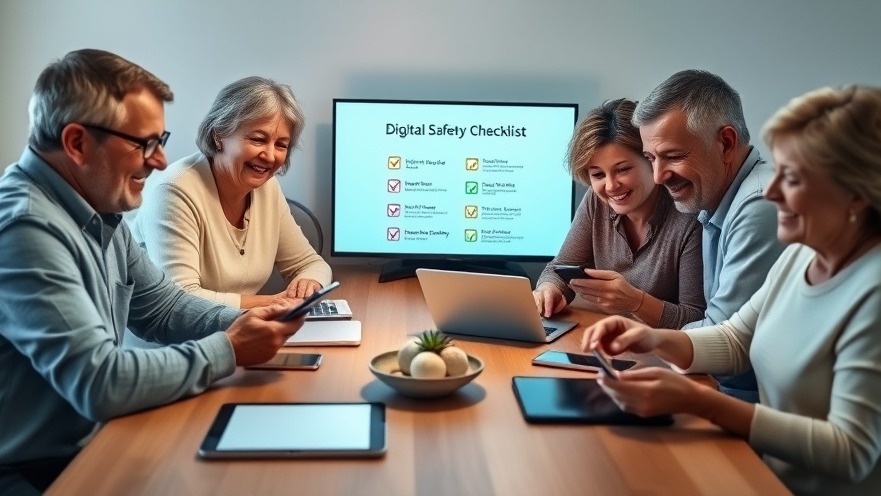
The Internet and Our Elders: Balancing Access and Safety
As adult children, we often guide our aging parents through new challenges, and the digital world is increasingly one of them.
Assessing each parent's comfort and cognitive abilities is key when considering their online access. It’s not just about age. A clear mind, regardless of age, can navigate the internet skillfully.
However, for those with significant cognitive decline or dementia, carefully managing online access is critical for their safety.
While the internet offers incredible benefits, it also presents evolving threats. This guide highlights key online dangers and how to avoid common scams, helping both you and your loved ones stay safe online.
Your First Line of Defense: Verify Before You Click
Before clicking any link, attachment, or graphic online, or responding to an email or calling a number from a message, always pause and verify its legitimacy. Never click or engage if you're uncertain about the source.
Phishing Scams: Guard Your Inbox and Texts
Phishing is a common online threat where scammers impersonate trusted organizations (banks, government, even family) to trick you into revealing personal information or clicking harmful links. They often use official-looking logos and designs, so don't be fooled by appearances alone.
What to look for:
Suspicious Sender: Check the email's full address. Does it match the official domain (e.g., chase.com) or is it a slight variation (chasse.com) or a Gmail address?
Unexpected Contact: Be skeptical of any message that arrives out of the blue, even if it looks official.
Urgency or Threats: Watch for phrases like "Your account will be suspended" or "Immediate action required." Scammers want you to panic.
Requests for Sensitive Info: Legitimate organizations rarely ask for your Social Security number, PINs, or full passwords via email or text.
Sketchy Links: Hover over links (don't click!) to see the actual web address. If it doesn't match the sender's official site, it's likely fake. Be extra cautious with text message links.
Grammar/Spelling Errors: While not always present, errors can be a giveaway.
If something feels off, it probably is. Never click links or provide information from a suspicious message. If you need to confirm something, go directly to the official website (e.g., type your bank's address into your browser) or call the organization using a number from a trusted source.
Deceptive "Tech Support" Scams
These scams often target those less familiar with computers. You might receive an unsolicited call claiming your computer has a virus (from "Microsoft," "Apple," etc.), or an alarming pop-up might appear on your screen with a fake "help" number.
What to look for:
Unexpected Calls: Real tech companies won't call you out of the blue about a virus.
Locking Pop-ups: Browser pop-ups that lock your screen and demand a call are nearly always scams.
Demands for Remote Access/Payment: Scammers push for remote control of your computer or immediate payment for a fake problem.
If you need tech support, always initiate contact yourself by visiting the company's official website or using a verified contact number. Check their online reviews and responses to those reviews.
Never give unsolicited remote access to your computer. If you suspect an issue, contact trusted tech support.
You can usually dismiss pop-up scams by simply closing your browser (using Task Manager ((Ctrl+Alt+Del)) on Windows or Force Quit on Mac if needed).
Strong Passwords & Safe Online Shopping
Your passwords are vital for online security. Weak or repeated passwords leave you vulnerable to identity theft.
Key Practices:
Create Strong Passwords: Avoid easily guessable information like birthdays, pet names, or simple number sequences.
Use Unique Passwords: Don't reuse passwords across different sites. If one site is compromised, all your accounts could be at risk.
Use a reputable password manager to create and store strong, unique passwords for each online account.
For online shopping, always check that the website address begins with "https://" (the 's' means secure) before entering payment details. Be wary of deals that seem too good to be true – they often are.
Staying Vigilant Together
The digital world and scam tactics are constantly evolving. Your best defense is a healthy dose of skepticism, open communication, and taking a moment to pause before you click, share, or buy.
Encourage your parents – and remind yourself – that if something feels off, it's always worth a second look or a quick family discussion. Shared vigilance is your strongest protection.
 Add Row
Add Row  Add
Add 




Write A Comment